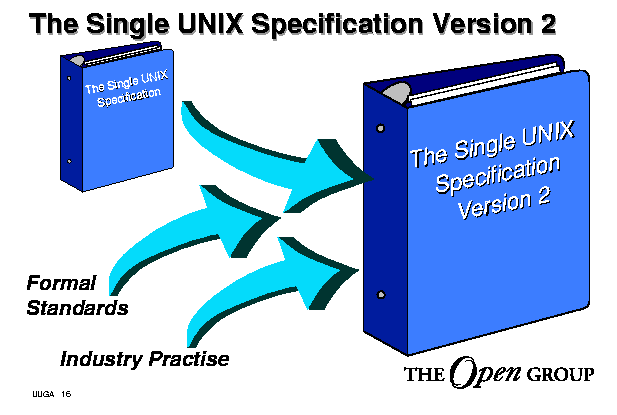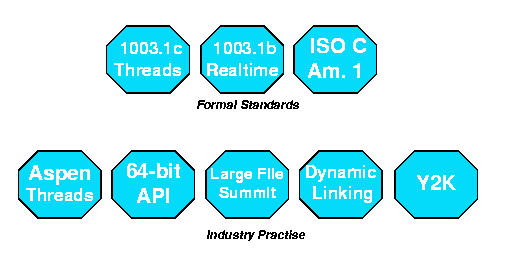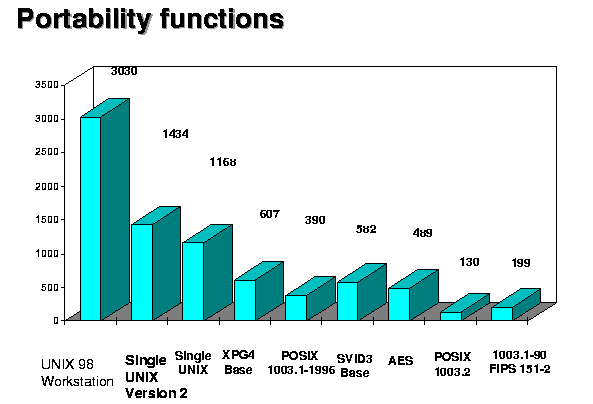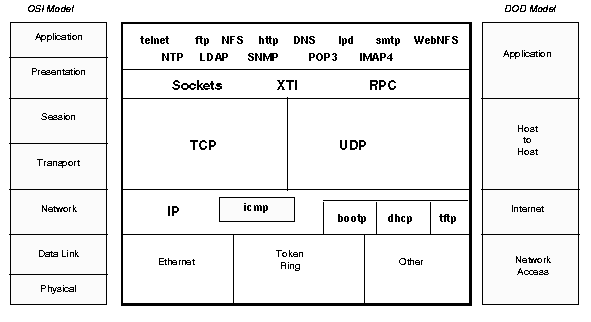
The Single UNIX® Specification, Version 2 and UNIX 98
A Technical White Paper from the Open Group.
Version 1.3 Last update January 3rd 1998.
Available as a PDF file
Abstract
Developed through the X/Open consensus process the Single UNIX
Specification Version 2 and the UNIX 98 Product Standards
introduce the next generation of 64-bit enabled
UNIX system architectures, and
reinforce the
UNIX trade mark as the industry recognized mark for the leading-edge
operating environment.
This delivers to the market the benefits of a single standard
operating system, namely application and information portability, scalability,
flexibility and freedom of choice for customers.
Continuing its commitment to Open Systems, The Open Group
is pleased to announce availability of the Single UNIX Specification,
Version 2 on the World Wide Web at URL
http://www.UNIX-systems.org/go/unix.

Version 2 of the Single UNIX Specification builds upon the original and updates
it with the latest formal standards and the latest industry practises.
In particular it introduces the following functionality into the core
definitions:

-
Alignment with the latest formal standards:
-
ISO/IEC 9945-1:1996 which incorporates
ANSI/IEEE Std POSIX 1003.1-1990, 1003.1b-1993,
1003.1c-1995 and 1003.1i-1995
[1003.1b-1993 and 1003.1i-1995 are Realtime extensions .
1003.1c-1995 is Threads extensions.]
The Realtime extensions are an optional feature group, allowing
procurement of X/Open realtime systems with predictable , bounded
behavior.
Threads interfaces, fully aligned with the POSIX Threads Extension,
permit development of applications to
make significant performance gains on multiprocessor hardware.
-
Multibyte Support Extension (MSE) aligned with
ISO C Amendment 1: 1995
to further support internationalised
applications.
-
Large File extensions
to permit UNIX systems to
support files of arbitrary sizes,
this is of particular relevance to database applications.
-
Extended Threads functions (known as Aspen Threads) over POSIX threads, based on industry input
from Sun, Digital, HP and DCE.
-
Dynamic linking extensions to permit applications to share
common code across many applications, and ease maintenance of
bug fixes and performance enhancements for applications.
-
Changes to remove hardware data-length dependencies or restrictions.
This is known as the N-bit cleanup (64 bit and beyond) .
This is of particular relevance
with the ongoing move to 64 bit CPUs.
-
Year 2000 Alignment to minimize the impact of the millennium rollover.

For those of us who count interfaces,
the Single UNIX Specification Version 2 now has over 1400 programming
interfaces. The UNIX 98 Workstation profile which includes CDE
(and thus X11 and Motif) increases this number to over 3000
programming interfaces.
What is UNIX 98 ?
UNIX 98 is the mark (or label) for systems conforming to Version 2 of the Single
UNIX Specification.
UNIX 98 is
-
A brand that can be applied to systems that conform to the Single UNIX
Specification Version 2.
-
A significant enhancement over XPG4 UNIX (UNIX 95)
If a product is registered as conformant to UNIX 98 the vendor
warrants and represents that it:
-
Complies with the specifications
-
Will continue to comply with the specifications
-
If a non-compliance is found it will be fixed in a prescribed timescale.
UNIX 98 is organized as a family of product standards addressing
different market needs.
-
UNIX 98
- The base product standard.
-
UNIX 98 Workstation
- The base product standard plus the Common Desktop
Environment (CDE)
-
UNIX 98 Server
-
Captures existing de-facto practice for internet/intranet
services. The additional functionality over the base UNIX 98
functionality includes:
-
The Internet Protocol Suite
-
Java Support
-
Internet capabilities to support network computing
The following diagram shows the internet services included
in the UNIX 98 Server product standard:

Benefits
Benefits for Application Developers
-
Greater consistency amongst UNIX® operating systems.
-
Improved portability.
-
Faster development through the increased number of standard interfaces.
-
More innovation is possible, due to the reduced time spent
porting applications
Benefits for Users
-
This is an evolution of the the XPG4 UNIX (UNIX 95) brand,
therefore protecting users investment in existing systems and
applications.
-
The availability of UNIX systems from multiple suppliers
gives users freedom of choice rather than being locked in
to a single supplier.
UNIX 98 Standards Feature Matrix
| Feature
| UNIX 95
| UNIX 98
| UNIX 98 WorkStation
| UNIX 98 Server
|
|---|
| System Software
|
| POSIX.1
| X
| X
| X
| X
|
| POSIX.2
| X
| X
| X
| X
|
| POSIX.1b
|
| X*
| X*
| X*
|
| POSIX.1c
|
| X
| X
| X
|
| FIPS 151-2
| X
| X
| X
| X
|
| FIPS 189
| X
| X
| X
| X
|
| ISO C
| X
| X
| X
| X
|
| ISO C Amendment 1
|
| X
| X
| X
|
| XSockets
| X
| X
| X
| X
|
| XTI
| X
| X
| X
| X
|
| XCURSES
| X
| X
| X
| X
|
| X/Open Threads Extension
|
| X
| X
| X
|
| Y2K Changes
|
| X
| X
| X
|
| Dynamic Linking
|
| X
| X
| X
|
| Large File Support
|
| X
| X
| X
|
| Data Size Neutral
|
| X
| X
| X
|
| User Interface
|
| CDE
|
|
| X
|
|
| Motif
|
|
| X
|
|
| X11 Window Server
|
|
| X
|
|
| Internet Standards
|
| Java Runtime Environment 1.1
|
|
|
| X
|
| Java Class Libraries 1.1
|
|
|
| X
|
| TCP/IP IPv4
|
|
|
| X
|
| HTTP 1.1 Server
|
|
|
| X
|
| SSL V3 Server
|
|
|
| X
|
| DNS Server
|
|
|
| X
|
| Secure DNS Server Extensions
|
|
|
| X
|
| Telnet Server
|
|
|
| X
|
| Ftp Server
|
|
|
| X
|
| NFS Server
|
|
|
| X
|
| WebNFS Server
|
|
|
| O
|
| POP3 Server
|
|
|
| X
|
| IMAP4 Server
|
|
|
| X
|
| SMTP Server
|
|
|
| X
|
| LPD Server
|
|
|
| X
|
| NTP Server
|
|
|
| X
|
| LDAP V2 Server
|
|
|
| X
|
| LDAP V3 Server
|
|
|
| O
|
| SNMP Agent
|
|
|
| X
|
| DHCP Server
|
|
|
| X
|
| TFTP Server
|
|
|
| X
|
| BOOTP Server
|
|
|
| X
|
O=Optional
*=Realtime Feature Group
UNIX vs POSIX Feature Matrix
| Feature
| FIPS 151-2
| UNIX 95
| UNIX 98
|
|---|
| 1003.1-90 Processes
| Multiple
| Multiple
| Multiple
|
| 1003.1-90 Pipes
| X
| X
| X
|
| 1003.1-90 Files and Directories
| X
| X
| X
|
| 1003.1-90 Basic I/O
| X
| X
| X
|
| 1003.1-90 Async I/O
| X
| X
| X
|
| 1003.1-90 Signals
| X
| X
| X
|
| 1003.1-90 Users and Groups
| X
| X
| X
|
| 1003.1b-93 File Synchronization
|
| X
| X
|
| 1003.1b-93 Memory Mapped Files
|
| X
| X
|
| 1003.1b-93 Memory Protection
|
| X
| X
|
| 1003.1b-93 Process Priority Scheduling
|
|
| Realtime FG
|
| 1003.1b-93 Memory Locking
|
|
| Realtime FG
|
| 1003.1b-93 Synchronized I/O
|
|
| Realtime FG
|
| 1003.1b-93 Asynchronized I/O
|
|
| Realtime FG
|
| 1003.1b-93 Hi Resolution Clocks & Timers
|
|
| Realtime FG
|
| 1003.1b-93 Realtime Signals
|
|
| Realtime FG
|
| 1003.1b-93 Semaphores
|
|
| Realtime FG
|
| 1003.1b-93 Shared Memory
|
|
| Realtime FG
|
| 1003.1b-93 IPC Message Passing
|
|
| Realtime FG
|
| 1003.1c-95 Threads
|
|
| X
|
| 1003.1c-95 Thread Safe Functions
|
|
| X
|
| 1003.1c-95 Thread Attribute Stack Address
|
|
| X
|
| 1003.1c-95 Thread Attribute Stack Size
|
|
| X
|
| 1003.1c-95 Thread Process Shared
|
|
| X
|
| 1003.1c-95 Thread Priority Scheduling
|
|
| Realtime Threads FG
|
| 1003.1c-95 Thread Priority Inheritence
|
|
| Realtime Threads FG
|
| 1003.1c-95 Thread Priority Protection
|
|
| Realtime Threads FG
|
| 1003.2/2a Shell & Utilities
|
| X
| X
|
| P1003.1g (DRAFT) Protocol Independent Interfaces
|
|
| X
|
FG=Feature Group
New Test Suites for UNIX 98
Open Group test tools are essential for proper development and
maintenance of standards-based products, ensuring conformance of
products to industry-standard APIs, application portability and
interoperability. In-depth testing identifies defects at the earliest
possible point in the development cycle, saving costs in development and
quality assurance. The real benefit of The Open group test tools to
suppliers is accelerated time-to-market of branded product.
Several new
test suites are being introduced with UNIX 98.
- VSTH - The industry standard Threads test suite :
a standalone test suite fully covering POSIX
1003.1c and the additional X/Open threads (Aspen) requirements. The suite
has a common operating and reporting interface consistent
with VSX, and is capable of being merged with VSX. The
consistency is achieved using the VSX generic harness, known as
VSXgen.
-
VSRT - The industry standard POSIX Realtime test suite:
a standalone test suite fully covering
POSIX 1003.1b and POSIX 1003.1i. The suite has a common
operating and reporting interface consistent with VSX, and is
capable of being merged with VSX (under VSXgen).
-
VSX5 - a new test suite which runs under the VSXgen harness:
includes tests for ISO C Amendment 1,
Dynamic Linking and Large File Summit extensions.
This suite is capable of being merged in with other test packages
running under VSXgen.
-
A major upgrade of VSC, the industry standard Commands & Utilities test
suite: includes Large File Summit extensions, n bit clean, Aspen commands
and year 2000 alignment.
-
A major upgrade of VSU, the industry standard test suite for Sockets,
Curses and other UNIX extensions: includes
Large File Summit extensions and n bit cleanup for the traditional
UNIX extensions; revised Sockets tests for XNS Issue 5; a major
upgrade of the Xcurses tests which are revised for X/Open Curses
Issue 4 Version 2.
-
A maintenance update of VST, the industry standard XTI test suite:
includes n bit cleanup.
For more information on new developments in Open Group testing , see
http://www.opengroup.org/testing/new.
More Information
More information on the Single UNIX Specification, Version 2
can be obtained from the following sources:
-
The Open Group Source Book "Go Solo 2 - The Authorized Guide to Version 2
of the Single UNIX Specification", 500 pages, ISBN 0-13-575689-8. This
book provides complete information on what's new in Version 2 , with
technical papers written by members of the working groups
that developed the specifications , and a
CD-ROM containing the complete 3000 page specification in both HTML
and PDF formats (including PDF reader software).
For more information see URL
http://www.opengroup.org/unix/gosolo2/.
-
More information on the Single UNIX Specification , including the
online version of the specification can be
obtained at The Open Group's official UNIX system world wide web site, see the URL
http://www.UNIX-systems.org/.
Copyright The Open Group, © 1997
UNIX is a registered trademark of The Open Group
[What is UNIX?] [Resources] [Vendors] [Questions & Answers] [Contacts]
Copyright © 1997,1998 , The Open Group.





